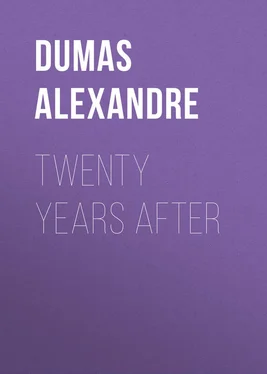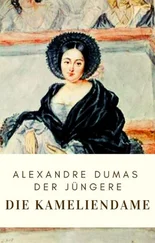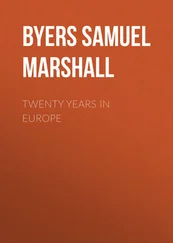Alexandre Dumas - Twenty Years After
Здесь есть возможность читать онлайн «Alexandre Dumas - Twenty Years After» — ознакомительный отрывок электронной книги совершенно бесплатно, а после прочтения отрывка купить полную версию. В некоторых случаях можно слушать аудио, скачать через торрент в формате fb2 и присутствует краткое содержание. Жанр: literature_19, foreign_antique, foreign_prose, на английском языке. Описание произведения, (предисловие) а так же отзывы посетителей доступны на портале библиотеки ЛибКат.
- Название:Twenty Years After
- Автор:
- Жанр:
- Год:неизвестен
- ISBN:нет данных
- Рейтинг книги:5 / 5. Голосов: 1
-
Избранное:Добавить в избранное
- Отзывы:
-
Ваша оценка:
- 100
- 1
- 2
- 3
- 4
- 5
Twenty Years After: краткое содержание, описание и аннотация
Предлагаем к чтению аннотацию, описание, краткое содержание или предисловие (зависит от того, что написал сам автор книги «Twenty Years After»). Если вы не нашли необходимую информацию о книге — напишите в комментариях, мы постараемся отыскать её.
Twenty Years After — читать онлайн ознакомительный отрывок
Ниже представлен текст книги, разбитый по страницам. Система сохранения места последней прочитанной страницы, позволяет с удобством читать онлайн бесплатно книгу «Twenty Years After», без необходимости каждый раз заново искать на чём Вы остановились. Поставьте закладку, и сможете в любой момент перейти на страницу, на которой закончили чтение.
Интервал:
Закладка:
Anne blushed and buried her face in her hands.
“What am I to do?” she said, bowed down beneath the voice of her tyrant.
“Endeavor to remember the names of those faithful servants who crossed the Channel, in spite of Monsieur de Richelieu, tracking the roads along which they passed by their blood, to bring back to your majesty certain jewels given by you to Buckingham.”
Anne arose, full of majesty, and as if touched by a spring, and looking at the cardinal with the haughty dignity which in the days of her youth had made her so powerful: “You are insulting me!” she said.
“I wish,” continued Mazarin, finishing, as it were, the speech this sudden movement of the queen had cut; “I wish, in fact, that you should now do for your husband what you formerly did for your lover.”
“Again that accusation!” cried the queen. “I thought that calumny was stifled or extinct; you have spared me till now, but since you speak of it, once for all, I tell you-”
“Madame, I do not ask you to tell me,” said Mazarin, astounded by this returning courage.
“I will tell you all,” replied Anne. “Listen: there were in truth, at that epoch, four devoted hearts, four loyal spirits, four faithful swords, who saved more than my life-my honor-”
“Ah! you confess it!” exclaimed Mazarin.
“Is it only the guilty whose honor is at the sport of others, sir? and cannot women be dishonored by appearances? Yes, appearances were against me and I was about to suffer dishonor. However, I swear I was not guilty, I swear it by-”
The queen looked around her for some sacred object by which she could swear, and taking out of a cupboard hidden in the tapestry, a small coffer of rosewood set in silver, and laying it on the altar:
“I swear,” she said, “by these sacred relics that Buckingham was not my lover.”
“What relics are those by which you swear?” asked Mazarin, smiling. “I am incredulous.”
The queen untied from around her throat a small golden key which hung there, and presented it to the cardinal.
“Open, sir,” she said, “and look for yourself.”
Mazarin opened the coffer; a knife, covered with rust, and two letters, one of which was stained with blood, alone met his gaze.
“What are these things?” he asked.
“What are these things?” replied Anne, with queen-like dignity, extending toward the open coffer an arm, despite the lapse of years, still beautiful. “These two letters are the only ones I ever wrote to him. This knife is the knife with which Felton stabbed him. Read the letters and see if I have lied or spoken the truth.”
But Mazarin, notwithstanding this permission, instead of reading the letters, took the knife which the dying Buckingham had snatched out of the wound and sent by Laporte to the queen. The blade was red, for the blood had become rust; after a momentary examination during which the queen became as white as the cloth which covered the altar on which she was leaning, he put it back into the coffer with an involuntary shudder.
“It is well, madame, I believe your oath.”
“No, no, read,” exclaimed the queen, indignantly; “read, I command you, for I am resolved that everything shall be finished to-night and never will I recur to this subject again. Do you think,” she said, with a ghastly smile, “that I shall be inclined to reopen this coffer to answer any future accusations?”
Mazarin, overcome by this determination, read the two letters. In one the queen asked for the ornaments back again. This letter had been conveyed by D’Artagnan and had arrived in time. The other was that which Laporte had placed in the hands of the Duke of Buckingham, warning him that he was about to be assassinated; that communication had arrived too late.
“It is well, madame,” said Mazarin; “nothing can gainsay such testimony.”
“Sir,” replied the queen, closing the coffer and leaning her hand upon it, “if there is anything to be said, it is that I have always been ungrateful to the brave men who saved me-that I have given nothing to that gallant officer, D’Artagnan, you were speaking of just now, but my hand to kiss and this diamond.”
As she spoke she extended her beautiful hand to the cardinal and showed him a superb diamond which sparkled on her finger.
“It appears,” she resumed, “that he sold it-he sold it in order to save me another time-to be able to send a messenger to the duke to warn him of his danger-he sold it to Monsieur des Essarts, on whose finger I remarked it. I bought it from him, but it belongs to D’Artagnan. Give it back to him, sir, and since you have such a man in your service, make him useful.”
“Thank you, madame,” said Mazarin. “I will profit by the advice.”
“And now,” added the queen, her voice broken by her emotion, “have you any other question to ask me?”
“Nothing,”-the cardinal spoke in his most conciliatory manner-“except to beg of you to forgive my unworthy suspicions. I love you so tenderly that I cannot help being jealous, even of the past.”
A smile, which was indefinable, passed over the lips of the queen.
“Since you have no further interrogations to make, leave me, I beseech you,” she said. “I wish, after such a scene, to be alone.”
Mazarin bent low before her.
“I will retire, madame. Do you permit me to return?”
“Yes, to-morrow.”
The cardinal took the queen’s hand and pressed it with an air of gallantry to his lips.
Scarcely had he left her when the queen went into her son’s room, and inquired from Laporte if the king was in bed. Laporte pointed to the child, who was asleep.
Anne ascended the steps side of the bed and softly kissed the placid forehead of her son; then she retired as silently as she had come, merely saying to Laporte:
“Try, my dear Laporte, to make the king more courteous to Monsieur le Cardinal, to whom both he and I are under such important obligations.”
5. The Gascon and the Italian
Meanwhile the cardinal returned to his own room; and after asking Bernouin, who stood at the door, whether anything had occurred during his absence, and being answered in the negative, he desired that he might be left alone.
When he was alone he opened the door of the corridor and then that of the ante-chamber. There D’Artagnan was asleep upon a bench.
The cardinal went up to him and touched his shoulder. D’Artagnan started, awakened himself, and as he awoke, stood up exactly like a soldier under arms.
“Here I am,” said he. “Who calls me?”
“I,” said Mazarin, with his most smiling expression.
“I ask pardon of your eminence,” said D’Artagnan, “but I was so fatigued-”
“Don’t ask my pardon, monsieur,” said Mazarin, “for you fatigued yourself in my service.”
D’Artagnan admired Mazarin’s gracious manner. “Ah,” said he, between his teeth, “is there truth in the proverb that fortune comes while one sleeps?”
“Follow me, monsieur,” said Mazarin.
“Come, come,” murmured D’Artagnan, “Rochefort has kept his promise, but where in the devil is he?” And he searched the cabinet even to the smallest recesses, but there was no sign of Rochefort.
“Monsieur d’Artagnan,” said the cardinal, sitting down on a fauteuil, “you have always seemed to me to be a brave and honorable man.”
“Possibly,” thought D’Artagnan, “but he has taken a long time to let me know his thoughts;” nevertheless, he bowed to the very ground in gratitude for Mazarin’s compliment.
“Well,” continued Mazarin, “the time has come to put to use your talents and your valor.”
There was a sudden gleam of joy in the officer’s eyes, which vanished immediately, for he knew nothing of Mazarin’s purpose.
Читать дальшеИнтервал:
Закладка:
Похожие книги на «Twenty Years After»
Представляем Вашему вниманию похожие книги на «Twenty Years After» списком для выбора. Мы отобрали схожую по названию и смыслу литературу в надежде предоставить читателям больше вариантов отыскать новые, интересные, ещё непрочитанные произведения.
Обсуждение, отзывы о книге «Twenty Years After» и просто собственные мнения читателей. Оставьте ваши комментарии, напишите, что Вы думаете о произведении, его смысле или главных героях. Укажите что конкретно понравилось, а что нет, и почему Вы так считаете.


![О Генри - Через двадцать лет [After Twenty Years]](/books/415401/o-genri-cherez-dvadcat-let-after-twenty-years-thumb.webp)









